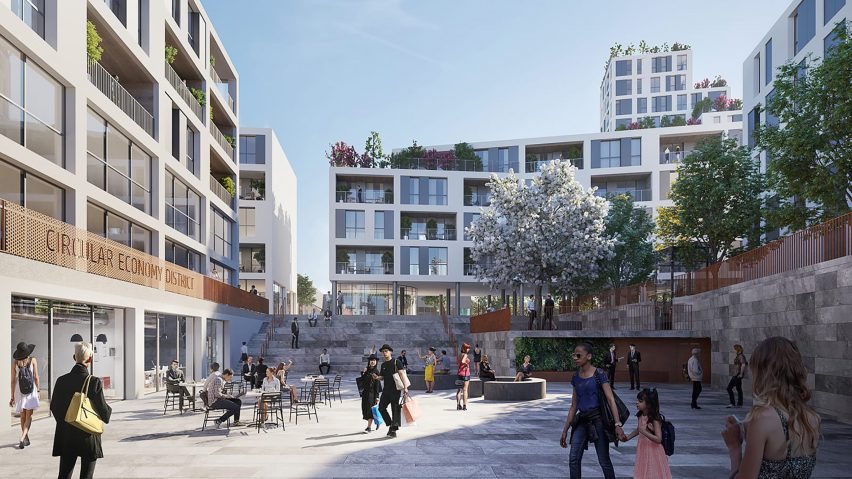Architecture studio Barreca & La Varra has designed a social housing project for Milan called L'Innesto, which will be carbon-neutral and encourage community self-management through shared spaces.
L'Innesto Milan is one of the winners of the Reinventing Cities global urban development competition, and Barreca & La Varra is aiming to make it the first zero-carbon example of Italy's "housing sociale".
The scheme is destined for Scalo Greco Breda, the six-hectare site of a former freight terminal, and will include 400 apartments, 300 student housing units and four hectares of public green space.
Barreca & La Varra and its partner Redo Sgr Spa Società, an ethical real-estate developer, aim to achieve carbon-neutrality after 30 years thanks to an innovative district heating network, nearly zero-energy buildings, and prefabricated construction technologies that also allow the building to be disassembled and recycled.
After 30 years of operation and management, these and other sustainability measures would balance out the carbon dioxide emitted during L'Innesto's construction.
Four key strategies to carbon neutrality
There are four key measures that the team is relying on to get the project to net zero. The first is a fourth-generation district heating network, which operates at a lower temperature and will be powered by renewable sources including urban wastewater.
The second is a hybrid timber construction system that combines uses less carbon-intensive materials like concrete and steel, and is designed to be disassembled and recycled at the end of the building's life.
The third is bioremediation and urban forestry. A portion of the excavated soil will be treated on site for landscaping – reducing greenhouse gas emissions – and around 60 per cent of L'Innesto's surface area will be dedicated to green space, which will draw down CO2 from the atmosphere.
The fourth pillar involves promoting active mobility, public transport and sharing systems, which is estimated to save the equivalent of 1,362 tonnes of CO2 during the first five years of the project, as the community moves away from private vehicle ownership.
L'Innesto will offer limited parking capacity, with only 100 spaces for 700 tenants, but will include 1,200 square metres of bike garage and 10 electric car charging terminals.
Inclusive and active approaches to community building
In addition to its sustainability strategies, L'Innesto is being planned as an affordable housing project that will experiment with new approaches to collaborative living.
Key to the project will be a "Human Adaptive Zone" of shared spaces, such as kitchens, living rooms and labs, and services that are shared and managed by residents, local operators and non-profit organisations.
"The Human Adaptive Zone offers to the neighbourhood the opportunity to develop projects and ideas," said Barreca & La Varra founding partner Gianandrea Barreca.
"These social, physical and technological infrastructures introduce self-managed functions that unite people on the basis of 'elective' geographies, extending their collaborative nature to a portion of the neighbourhood instead of a single building," added co-founder Giovanni La Varra.
There will also be outdoor public spaces such as arcades, squares and "broletti" — traditionally, places for democratic assembly — and a circular economy district, a community food hub and a zero-waste food store.
The L'Innesto team has made a 30-year commitment to integrated management of the site through these shared spaces. Construction will start in 2023.
Reinventing Cities competition promotes sustainable urban development
The Reinventing Cities competition aims to help cities align themselves with the aims of the 2005 Paris Agreement, which commits signatories to cap global warming at 1.5 degrees Celsius above pre-industrial levels.
L'Innesto was one of the winners of the second round of the competition, for which nine cities – Cape Town, Chicago, Dubai, Madrid, Milan, Montreal, Singapore, Reykjavik and Rome – identified 25 under-utilised sites for development.
Run by C40, the competition requires multidisciplinary teams of architects, planners, developers and community leaders to team up and submit proposals that deliver carbon-neutral and resilient urban regeneration.
Among the other winners in the competition are a cross-laminated timber building destined for a landfill site in Reykjavik and a car-free neighbourhood that will take over an old railway station in Rome.
Project credits
Team L'Innesto: Redo Sgr Spa Società benefit (leader), Fondazione Housing Sociale and Planet Smart City (digital and social innovation), Barreca & La Varra (masterplan, architecture), Arup (environmental experts), A2A Calore e Servizi (Energy), Politecnico di Milano, Politecnico di Torino, Cresme Ricerche (research centers), Cariplo Factory and Intesa San Paolo Innovation Center (innovation)
Other partners: Delta Ecopolis, In-Domus, Fondazione Social Venture Giordano dell'Amore, Future Fond, Fungo Box, The Circle, Peverelli

